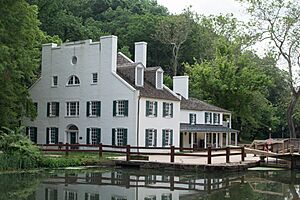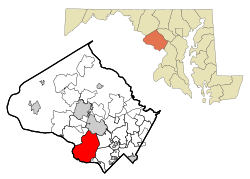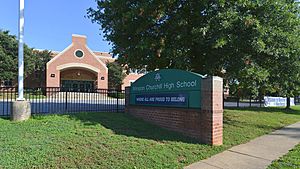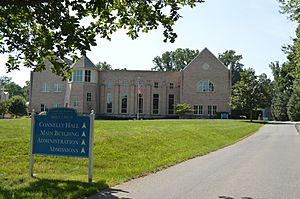Potomac, Maryland facts for kids
Quick facts for kids
Potomac, Maryland
|
|
|---|---|

Great Falls Tavern
|
|

Location of Potomac in Maryland
|
|
| Country | |
| State | |
| County | Montgomery |
| First settled | 1714 |
| Area | |
| • Total | 26.58 sq mi (68.85 km2) |
| • Land | 25.14 sq mi (65.12 km2) |
| • Water | 1.44 sq mi (3.73 km2) |
| Elevation | 292 ft (89 m) |
| Population
(2020)
|
|
| • Total | 47,018 |
| • Density | 1,869.95/sq mi (721.99/km2) |
| Time zone | UTC−5 (Eastern (EST)) |
| • Summer (DST) | UTC−4 (EDT) |
| ZIP Codes |
20854, 20859
|
| Area code(s) | 301, 240 |
| FIPS code | 24-63300 |
| GNIS feature ID | 2389701 |
Potomac is a community in Montgomery County, Maryland, United States. It is called a census-designated place because it is a special area the government uses to collect information. In 2020, about 47,018 people lived there.
The community gets its name from the nearby Potomac River. Potomac is part of the larger Washington metropolitan area. Many people who live in Potomac work in nearby Washington, D.C. or Northern Virginia.
Contents
History of Potomac: How it Grew
Early Beginnings: Settling the Land
The area where Potomac is today was first settled in 1714. A person named Edward Offutt received a large piece of land, about 600 acres, from Lord Baltimore. This land was near an old Native American trade path called the Tehogee Indian Trail. The Canaze Native American nation built this trail in 1716.
For many years in the 1700s, this small, country area was known as "Offutts Crossroads." It was a simple community that helped farmers and travelers. In the 1800s, more small homes were built, and a tavern opened in 1820. By the time of the American Civil War, the community had two general stores, a blacksmith shop, and a post office. About 100 people lived there.
A New Name: From Crossroads to Potomac
In 1881, the community's name changed from Offutts Crossroads to "Potomac." This change happened because John McDonald asked for it. He was an Irish man and a veteran of the Civil War who moved to Potomac around that time. Postal workers wanted shorter names for towns, and there were already many other "crossroads" communities nearby.
Growing into a Modern Community
Potomac started to grow more at the beginning of the 1900s. In 1902, a store owner named Thomas Perry built a house at the corner of Falls and River Roads. More homes were built along Falls Road in the 1920s and 1930s.
In the 1950s, Potomac changed a lot. It became a suburban community because it was close to Washington, D.C.. This meant it changed from a quiet farming area to a busier place with more homes and people.
Many of the old buildings in Potomac Village were taken down to build new shopping centers and offices. However, some old farmhouses still stand in the areas around the village. The historic Perry Store was saved and moved in 1986. It is now part of a bank.
Geography and Location
Where is Potomac Located?
The main part of Potomac is called Potomac Village. This is a small area with shops and businesses. It is located where Maryland State Highway 189 (Falls Road) and Maryland State Highway 190 (River Road) meet. This spot is northwest of Washington, D.C..
The U.S. Census Bureau says that Potomac covers about 26.6 square miles. Most of this area, about 25.2 square miles, is land. The rest, about 1.4 square miles, is water. Potomac uses the ZIP Code 20854 for homes and businesses, and 20859 for Post Office Boxes.
What is Potomac's Climate Like?
Potomac has a climate with hot, humid summers. The winters are usually cool to cold, with some light snow. This type of weather is known as a humid subtropical climate.
Population and People
| Historical population | |||
|---|---|---|---|
| Census | Pop. | %± | |
| 1980 | 40,401 | — | |
| 1990 | 45,634 | 13.0% | |
| 2000 | 46,255 | 1.4% | |
| 2010 | 44,965 | −2.8% | |
| 2020 | 47,018 | 4.6% | |
| source: 2010–2020 |
|||
How Many People Live in Potomac?
In 2010, there were 44,965 people living in Potomac. This included 16,093 households, which are groups of people living together in one home. The population density was about 1,790 people per square mile. By 2017, the number of people living in Potomac was estimated to be 45,780.
Who Lives in Potomac?
In 2010, the people living in Potomac were mostly White (75.8%). There were also African American residents (4.6%), Asian residents (15.9%), and a small number of Native American and Pacific Islander residents. About 6.4% of the population were Hispanic or Latino.
Many households in Potomac have families. In 2010, 38.4% of households had children under 18. Most households (74.8%) were married couples living together. The average household had 2.84 people.
In 2019, the typical home in Potomac was worth about $893,000. Most people (87.6%) owned their homes.
Age and Income in Potomac
In 2010, about 25.3% of the people in Potomac were under 18 years old. About 13.8% were 65 or older. The average age was 44 years old.
In 2017, the typical income for a household in Potomac was $187,568. A small number of families, about 2.5%, lived below the poverty line.
Arts and Culture
Potomac has a local branch of the Montgomery County Public Libraries. This library offers books, programs, and resources for the community.
Education in Potomac
Public Schools in Potomac
The Montgomery County Public Schools system operates several schools in Potomac. These include:
- Bells Mill Elementary
- Beverly Farms Elementary
- Cabin John Middle School
- Cold Spring Elementary
- Herbert Hoover Middle School
- Potomac Elementary
- Stone Mill Elementary
- Travilah Elementary
- Wayside Elementary
- Winston Churchill High School
Private Schools in Potomac
Potomac is also home to several private schools:
- Bullis School
- German School Washington, D.C.
- McLean School of Maryland
- Norwood School
- The Harbor School
Religious Schools in Potomac
There are also religious schools in the area:
- Connelly School of the Holy Child
- Our Lady of Mercy Catholic School
- St. Andrew's Episcopal School
- The Heights School
Notable People from Potomac
Many interesting people have lived in Potomac. You can find a full list of them in the List of people from Potomac, Maryland article.
See also
 In Spanish: Potomac (Maryland) para niños
In Spanish: Potomac (Maryland) para niños



